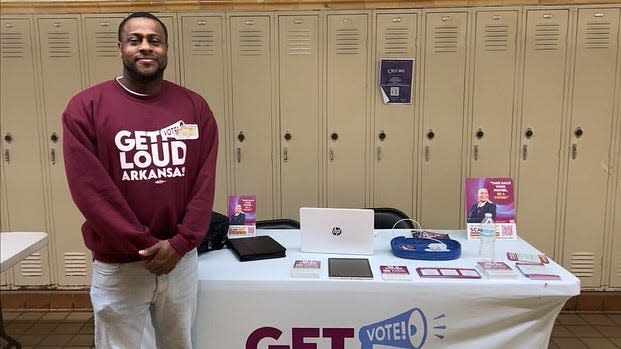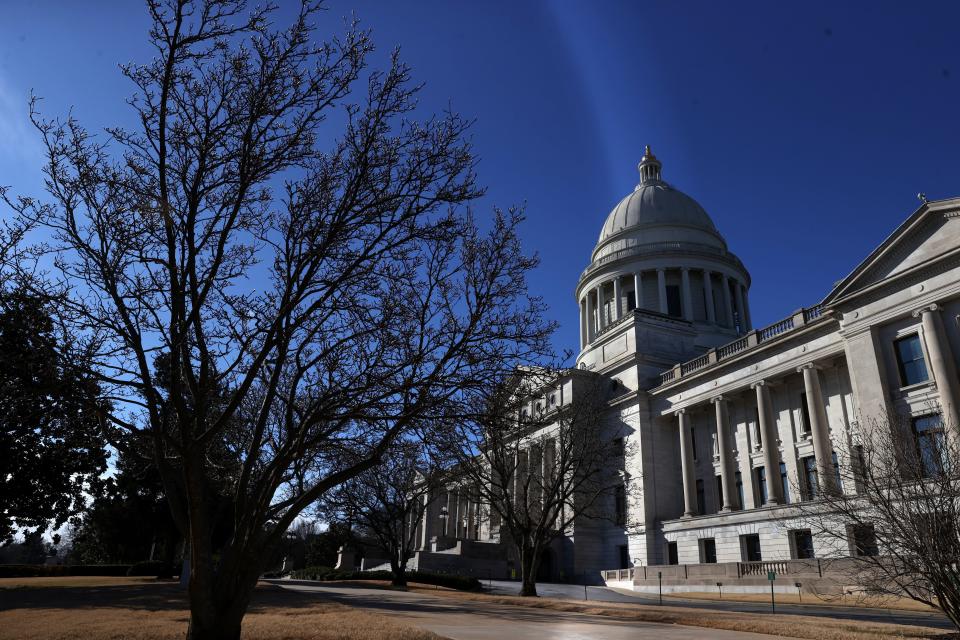Arkansas bans electronic voter registration signatures, a move voting groups call 'shameful'
- Oops!Something went wrong.Please try again later.
The Arkansas Board of Election Commissioners banned the use of electronic signatures on voter registration forms Tuesday in a controversial emergency rule.
Chris Madison, director of the Arkansas Board of Elections, said in an interview Tuesday that the rule was adopted in the interest of efficiency and consistent practice across counties, some of which accepted e-signatures while others did not.
“The board decided we needed to do a rule to get everybody playing by the same rules," he said.
But voting rights organizations are criticizing the decision.
Andrea Hailey, CEO of Vote.org, the largest nonpartisan voter registration group in the U.S., said in a statement that the move, which she called “shameful,” could “potentially disqualify tens of thousands of voter registration forms already submitted.”

Former Democratic state Sen. Joyce Elliott, founder of the group Get Loud Arkansas, said the new rule was spurred by her group's activities. Get Loud Arkansas is one of the few and the largest groups in Arkansas to use tablets to register voters.
“This amounts to voter suppression,” she said.
Voting across the South: Voter ID and absentee-ballot limits: the South tightens key voting laws ahead of election
According to Madison, the rule is also meant to streamline the voter registration process.
“The signature on a voter registration application in Arkansas is more than just affirming that I'm eligible to be a voter,” he said. “The signature acts as an identification mark.”
An electronic signature might be less likely to match one signed with ink on paper, he said, and in that case the county clerk would need to get in touch with the voter to “cure,” or verify, their ballot or ballot application.
“I would rather cure a few hundred versus several thousand," he said. "What we don't want happening is voters that have registered with an electronic signature now trying to vote in November and running into problems."
The emergency rule only allows for certain state agencies, like disability services and the Office of Driver Services, to use electronic signatures, consistent with its interpretation of Amendment 51 of the Arkansas Constitution, which does not explicitly prohibit e-signatures.
What does this mean for voter registration efforts?
“It is absolutely a setback which we must overcome because we are not going to abandon that mission,” Elliott said on Wednesday. “It means our work will be significantly slowed down.”
Get Loud Arkansas will have to contact all the people that it helped register using electronic signatures and redo their registrations on paper with “wet signatures” in ink.
Some of those voters are students at a high school where Get Loud held a voter registration drive.

“That really is heavy on my mind — the message that's being sent to young people,” when they face obstacles to voting like having to unexpectedly redo their registration, Elliott said.
She said the people that benefit most from Get Loud’s registration campaigns are young people, minorities, single parents and people in rural areas.
“Many times, they are disenfranchised simply because the tools and the time are not available to them," Elliott said.
The statement released by Vote.org on Wednesday called the rule part of a pattern “of harmful anti-voter laws and policies enacted since the 2020 election."
It went on to say that rules "requiring a 'wet' signature impact underserved communities in particular; only one in five SNAP recipients, for example, have access to a printer.”
“There's no doubt that using [an electronic] application is a game changer to get more people involved in our democratic process of voting,” Elliott said.
“When you say, on the one hand, you want everybody to have access to the ballot, to our democracy, but you make it harder, I can't help but surmise that that's really not the major interest, because they had the authority to rule in a way [that didn’t make registration more difficult] and not go afoul of the law,” she said.
“Even according to the Attorney General, you are not running afoul of the law if you allow the e-signature,” she said, referring to Arkansas Attorney General Tim Griffin’s April 10 opinion which said that e-signatures are valid as long as they’re “on a form created and distributed by the Secretary of State’s office.”
Elliott said that Get Loud doesn’t have a concrete plan yet to challenge the new rule, but going to court is on the table.
The emergency rule will stay in effect for three months, allowing time for a new permanent rule to be drafted by the Board of Election Commissioners and approved by the legislature.
This article originally appeared on Fort Smith Times Record: Arkansas bans electronic voter registration signatures

